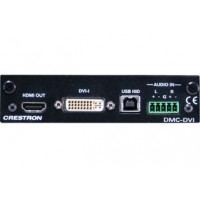Call Now: 1-800-284-2288 |
DVI/RGB Input Card for DigitalMedia Switchers |
|
|
|
|
The DMC-DVI is an input card for a Crestron® DigitalMedia™ Switcher, providing one DVI digital video input or analog RGB/Component input[1], plus stereo analog audio. The DMC-DVI handles computer resolutions up to WUXGA 1920 x 1200, as well as HDTV up to 1080p60. Professional balanced/unbalanced audio inputs are included to accept a stereo line level audio signal, which is converted to digital and embed along with the digital video to create a new HDMI™ stream for distribution via DigitalMedia.
Additional connections on the card include an HDMI output and a USB HID device port. The HDMI output simply passes the audio and video input signals through to feed a local device, or to feed a second DM switcher for output expansion purposes. The USB HID port connects to the source device (i.e. computer or media server) at the central equipment rack, allowing it to be controlled by a mouse or keyboard located in another room, or at a presentation lectern, conference table, or some other remote location.
The DMC-DVI may also be used with the DMCI DigitalMedia Card Interface to create a very handy problem-solving tool with many useful functions. For instance, it can be used to merge DVI digital video and analog stereo audio into a single HDMI output. As part of a complete Crestron control system, it can be used to detect and manage EDID and input source format information, to assess a device's HDCP capabilities, and to extend a USB HID mouse/keyboard signal over Ethernet.
Whether installed in a DM switcher or DMCI, the DMC-DVI card affords a perfect digital upgrade for analog-based systems like Crestron MPS, QuickMedia®, and the CEN-RGBHV Series. A simple HD15 VGA cable and balanced stereo audio cable connected between the output of an MPS system and the input of the DMC-DVI allows every RGB, component, S-Video, composite video, and audio input on the MPS to be converted to DigitalMedia[3].
| Video | ||
| Input Signal Types | DVI, RGB, component (YPbPr)[1], S-Video (Y/C)[1], composite[1] | |
| Output Signal Types | HDMI™ or DVI[2] to switcher backplane and HDMI OUT connector | |
| Formats | DVI, HDCP v.1.2 content protection support, RGBHV up to UXGA/WUXGA, HDTV up to 1080p60, NTSC or PAL | |
| Input Resolutions, DVI, Progressive | 640x480@60Hz, 720x480@60Hz (480p), 720x576@50Hz (576p), 800x600@60Hz, 848x480@60Hz, 852x480@60Hz, 854x480@60Hz, 1024x768@60Hz, 1024x852@60Hz, 1024x1024@60Hz, 1280x720@50Hz (720p50), 1280x720@60Hz (720p60), 1280x768@60Hz, 1280x800@60Hz, 1280x960@60Hz, 1280x1024@60Hz, 1360x768@60Hz, 1365x1024@60Hz, 1366x768@60Hz, 1400x1050@60Hz, 1440x900@60Hz, 1600x900@60Hz, 1600x1200@60Hz, 1680x1050@60Hz, 1920x1080@24Hz (1080p24), 1920x1080@25Hz (1080p25), 1920x1080@50Hz (1080p50), 1920x1080@60Hz (1080p60), 1920x1200@60Hz, 2048x1080@24Hz, 2048x1152@60Hz, plus any other resolution allowed by Single-link DVI up to 165MHz pixel clock | |
| Input Resolutions, DVI, Interlaced | 720x480@30Hz (480i), 720x576@25Hz (576i), 1920x1080@25Hz (1080i25), 1920x1080@30Hz (1080i30), plus any other resolution allowed by Single-link DVI up to 165MHz pixel clock | |
| Input Resolutions, RGB[1] | 640x480@60Hz, 720x480@60Hz (480p), 720x576@50Hz (576p), 800x600@60Hz, 848x480@60Hz, 1024x768@60Hz, 1280x720@50Hz (720p50), 1280x720@60Hz (720p60), 1280x768@60Hz, 1280x800@60Hz, 1280x960@60Hz, 1280x1024@60Hz, 1360x768@60Hz, 1366x768@60Hz, 1400x1050@60Hz, 1440x900@60Hz, 1600x1200@60Hz, 1680x1050@60Hz, 1920x1080@24Hz (1080p24), 1920x1080@50Hz (1080p50), 1920x1080@60Hz (1080p60), 1920x1200@60Hz, 2048x1080@24Hz, 2048x1152@60Hz | |
| Input Resolutions, Component[1] | 480i, 576i, 480p, 576p, 720p50, 720p60, 1080i25 (1125 lines), 1080i30, 1080p30, 1080p50 (1125 lines), 1080p60 | |
| Input Resolutions, Composite and S-Video[1] | 480i, 576i | |
| Output Resolutions | Matched to inputs | |
| Analog-To-Digital Conversion | 10-bit 170 MHz | |
| Audio | ||
| Input Signal Types | Analog stereo | |
| Output Signal Types | HDMI to switcher backplane and HDMI OUT connector | |
| Formats | Stereo 2-channel | |
| Analog-To-Digital Conversion | 24-bit 48 kHz | |
| Performance (analog) | Frequency Response: 20Hz to 20kHz ±0.75dB; S/N Ratio: >95dB, 20Hz to 20kHz A-weighted; THD+N: <0.005% @ 1kHz; Stereo Separation: >90dB |
|
| USB | ||
| Protocols | Supports USB HID class devices | |
| Connectors | ||
| HDMI OUT | (1) 19-pin Type A HDMI female; HDMI digital video/audio output; Also supports DVI[2] |
|
| DVI-I IN | DVI-I female (or DB15HD female via adapter included) DVI, RGB (VGA), or component (YPbPr) video input[1]; Analog Formats: RGBHV, RGBS, RGsB, YPbPr; Analog Input Levels: 0.5 to 1.5 Vp-p with built-in DC restoration; Analog Input Impedance: 75 Ohms; Analog Sync Input Type: Autodetect RGBHV, RGBS, RGsB, YPbPr; Analog Sync Input Level: 3 to 5 Vp-p; Analog Sync Input Impedance: 1k Ohms; |
|
| USB HID | (1) USB Type B female; USB 1.1 device port for connection to the USB host interface of a computer or other USB HID-compliant host device |
|
| AUDIO IN | (1) 5-pin 3.5mm detachable terminal block; Balanced/unbalanced stereo line-level input; Input Impedance: 24k Ohms balanced/unbalanced; Balanced Input Level: 4 Vrms maximum; Unbalanced Input Level: 2 Vrms maximum |
|
| Construction | ||
| Plug-in card, occupies (1) DM Switcher input card slot, includes metal faceplate w/black finish | ||
| Weight | ||
| 8.0 oz (227 g) | ||
| dmc-dvi.pdf | Datasheet |
Call Now: 1-800-284-2288 |
|||||
Email Us: sales@avsupply |
|||||
|







